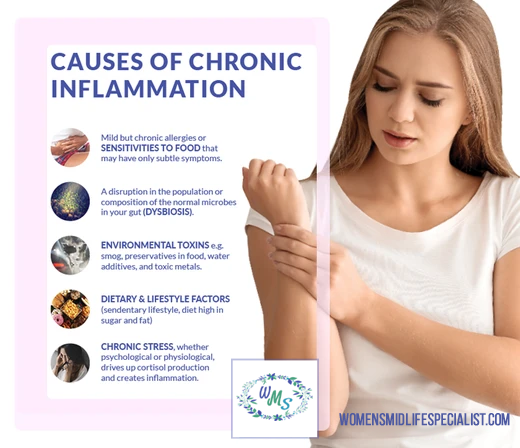Chronic inflammation’s role in cancer development isn’t a small one.

As many as one in five cancers are believed to be caused or influenced by inflammation.
One reason is that chronic inflammation may damage DNA.
Other times, the inflammatory process produces molecules called cytokines, which stimulate the growth of blood vessels that bring oxygen and nutrients to the tumor. The process also may generate molecules called free radicals that further damage the DNA. These inflammation side effects may help sustain and fuel cancer growth.
The reason inflammation becomes chronic isn’t always apparent. It may be caused by infections that don’t go away, abnormal immune reactions to normal tissues, or certain conditions like obesity. Over time, chronic inflammation may damage DNA, leading to conditions like heart disease, type 2 diabetes, stroke and cancer. “Anything that causes inflammation will cause the DNA of a cell to replicate faster,” says Brad Mons, DO, Head and Neck Surgeon at our hospital in Tulsa. “The more your cells replicate, the higher chance you have of cancers developing.”
Sometimes, cancer-causing chronic inflammation stems from a disease characterized by inflammation. The inflammatory diseases colitis, pancreatitis and hepatitis, for example, are linked to a greater risk of colon, pancreatic and liver cancers, respectively. In these diseases, immune cells create highly reactive molecules containing oxygen and nitrogen that can damage DNA. Inflammation also may cause cells to divide.
With 35 percent of cancers linked to dietary factors like obesity, stress and lack of exercise, the association between lifestyle habits and inflammation remains a concern.
These factors trigger an immune response, even without an infection to fight off or an injured tissue to heal. “The reason inflammation gets so much attention in the press right now is because a lot of it is dependent on our lifestyle,” Dr. Ahn says. “The more sedentary you are and the worse your diet is, the more inflammation you’re generating.”
Diet and exercise top the healthy lifestyle list. Even small changes can make a difference, like adding more plant-based foods that contain anti-inflammatory phytonutrients, eating more fermented foods, such as yogurt and miso, which contain natural probiotics that reduce inflammation.
Also limit processed foods because preservatives are acting as irritants - eat fresh produce. Alcohol can act as an irritant, too, especially in the head and neck—the first area food or drink touches when swallowed. Another concern: Alcohol and its byproducts may damage the liver and lead to inflammation in the organ.
Source: Cancer Treatment Center of America
cancercenter.com


Leave a comment